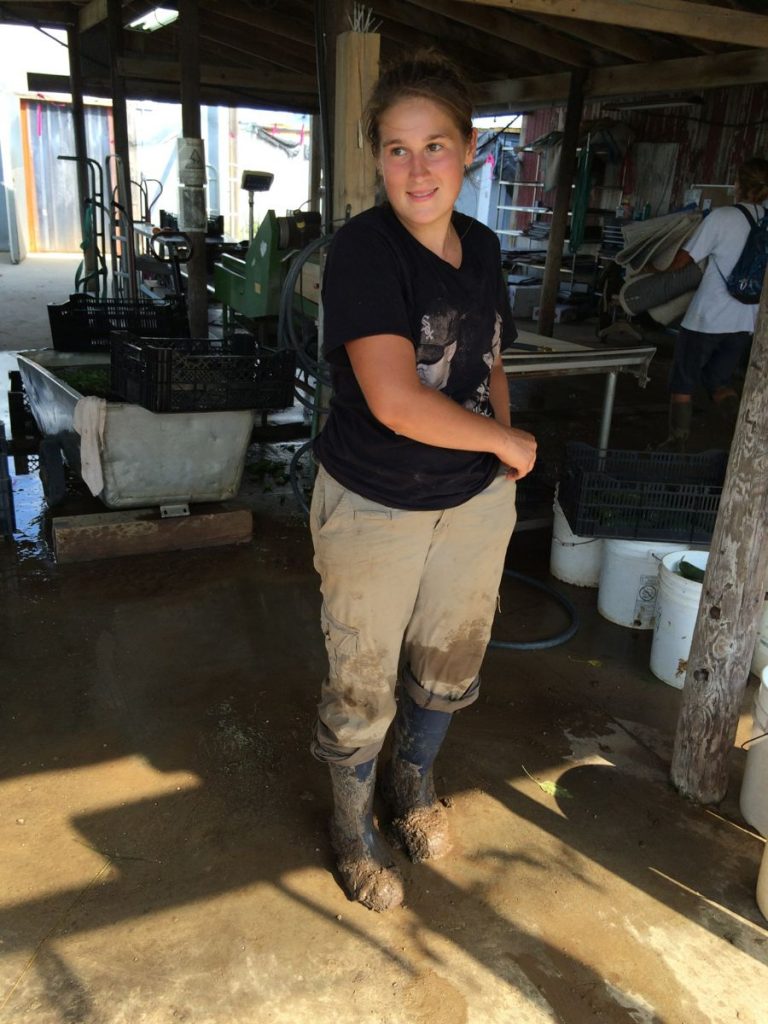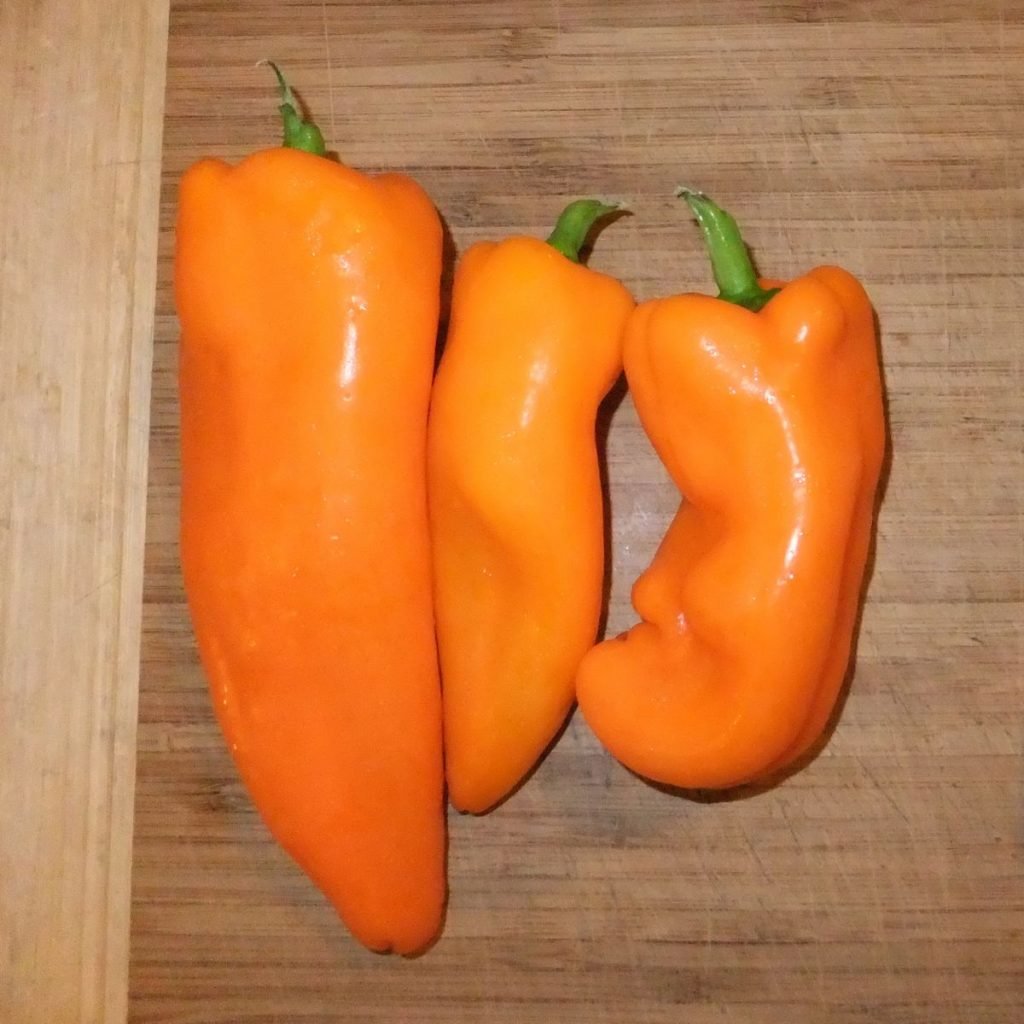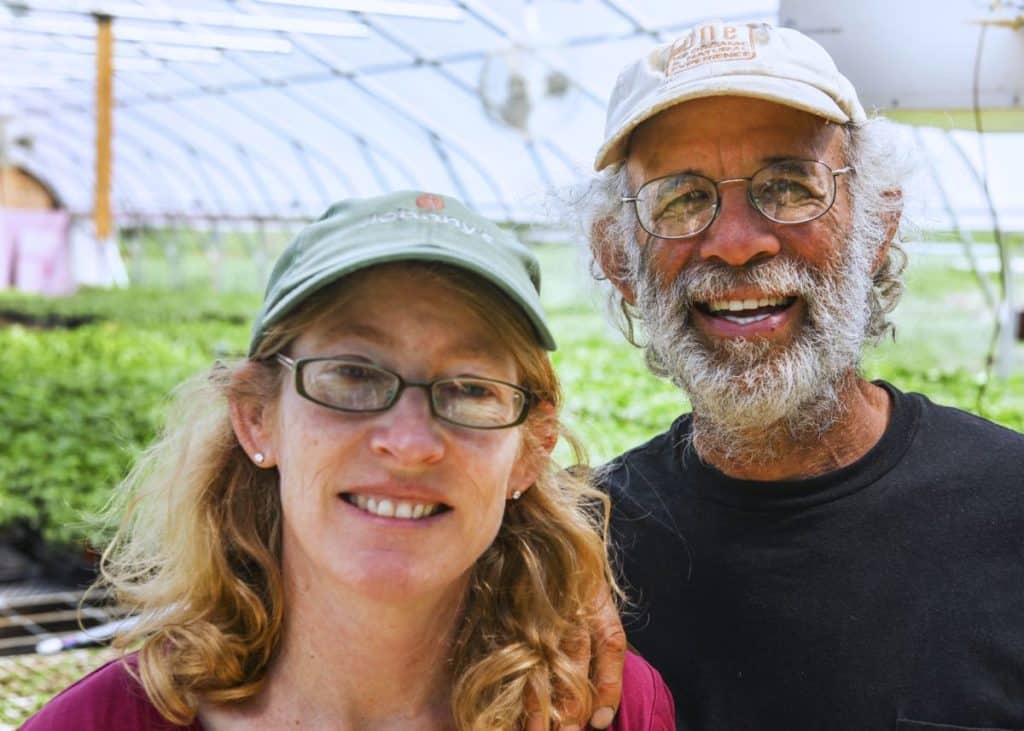August 25, 2016
- On: August 24, 2016
 0
0
I sat down to choose photos for tonight’s newsletter. Lo and beyond, I had filled my phone with photos of experimental basil. Why didn’t I take pictures of our photogenic crops and crew?? There are some weeding photos, but the crew nixed them as too unglamorous.
My ‘side job’ of tracking crop diseases is important farm work and gives me a welcome break from our focus on harvests and deliveries. In our small basil trial, I planted breeding lines from Bejo, the European seed company that developed the disease-resistant Eleonora variety that we grow in summer plantings. I approached Bejo and offered to test their newest lines and breeding materials. Bejo is selecting for resistance to downy mildew, a disease that ruined our summer basil plantings a few years ago. We have a better handle on that problem now, with Eleonora a useful part of the solution. I am very interested to see their newest breeding. I have to say that some of the experimental lines taste terrible … as in “spit-them-out-on-the-ground” terrible. However, the real test is how they react to downy mildew. It hasn’t shown up yet but spores blow into the state each year, so we will see it eventually.

Experimental basil lines with carrots (and weeds) on either side.
We are still transplanting seedlings because we need to feed you into the fall. Our weekly Monday to Thursday harvest schedule means we usually transplant on Fridays. However, it’s rained the last four Thursday nights, ruling out Friday transplanting. The crew worked late this Tuesday to rush in a planting. Broccoli, napa cabbage, kohlrabi and the final basil are all tucked in the ground. Good thing, because it rained again Tuesday night and probably will again tonight. We still have one final transplanting to go, a small field of quick-growing, cold-hardy Asian greens. Then we can grease the transplanter and pack it up for the winter.
We feel lucky that we didn’t get much rain this spring, even though we grumbled about the extra irrigation work. Spring was rainy in much of Wisconsin, conditions that can jump-start disease problems for the rest of the year. Weather-related problems are popping up in some of our crops but could be much, much worse. However, we are having trouble staying ahead of the weeds because of the rain. Steve is beginning to despair about it. He cultivates the weeds but they simply re-root with the next rain.

Check out Jackie’s boots after sweet corn harvest today. They got sucked off her feet in the mud. That tells you what our bottom fields look like.
Veggie list and veggie notes (August 25/26, 2016, week #15, green EOW)
Sweet corn, ~8 ears
Green beans, 1.25 lb
Collard greens, 1 bunch
Slicing tomatoes, 4 lb
Colored bell pepper, 1 – 2
Oranos peppers, 2 – 3
(Total peppers is ~4 per box.)
Cucumber(s) OR a few pickles, by site
Zucchini/squash, ~1
Walla Walla onion
Basil, 2 sprigs (Italian or Thai by site)
Garlic, 1 bulb
Some sites get an heirloom tomato.
Some sites get globe eggplant.
Next week’s box will probably contain tomatoes, peppers, melon, edamame soybeans, cucumbers and more.
Sweet corn – Looks like some of the corn will need trimming again this week. We harvested two separate plantings. One has bugs at the tip, one doesn’t.
Collard greens – First harvest from a fresh planting, these are quite nice.
Oranos peppers (orange, tapered, sweet) – These sweet orange peppers look like frying peppers but behave like bell peppers during cooking. We love them as a snack or lunchbox pepper – a perfect little package. Flavor is excellent, yummy. Really, can you tell that I like these peppers?
Heirloom tomatoes – New this week, we did not wash the heirloom tomatoes, to reduce handling and minimize bruising. They are fragile! There might be a little dirt or a dried leaf on the tomato, but we figure you can take care of that. We love these fragile tomatoes (and you tell us the same) so we continue to tweak how we grow and handle them. Here’s the info I sent a few weeks ago, for those who haven’t gotten an heirloom tomato yet:
If you find a single tomato in your box (not in the paper bag), then it’s an heirloom tomato. We tuck those near the top of the box where they won’t get damaged. Heirloom tomatoes are unusually flavorful and unusually fragile. Some are ripe and ready to eat. Some need a day or two to ripen. Place on your kitchen counter so you can keep an eye on it, and eat it as soon as it’s ripe. These bruise very easily so handle gently.
Basil – Some sites get Eleonora Italian basil this week, some sites get Thai basil.
Garlic – This week’s garlic is from our friend John Hendrickson of Stone Circle Farm.
RECIPES FROM LAUREN
GREEN BEAN & TOMATO SALAD WITH BUTTERMILK DRESSING
Takes 20 minutes
Serves 4-6
1 pound beans, trimmed
1/4 cup buttermilk
1/4 cup plain yogurt (Greek is great, but not essential; sour cream would also work if you don’t have yogurt on hand)
2 teaspoons fresh lemon juice
Ω teaspoon†minced garlic
1/2 sweet onion, minced
Handful basil, finely chopped
1 tablespoon olive oil, plus more for drizzling
Kosher salt and freshly ground black pepper
1 cup†diced tomatoes, cored (but not seeded)
- In a small bowl, whisk buttermilk, yogurt, lemon juice, garlic, onion, basil and olive oil together until totally smooth (I often do this in a mason jar and then just shake vigorously: I feel like the garlic and onions get better distributed this way). Season with salt and pepper. Set aside while you prepare the rest of the salad. This will help mellow the raw garlic and onion.
- Cook beans in a large pot of boiling salted water for 3 minutes. Drain and rinse with cold water. They should be just barely cooked.
- To serve, divide tomatoes among several small bowls. Drizzle with olive oil. Season with Kosher salt and freshly ground black pepper. Top with cooked beans. Shake (or whisk) buttermilk dressing a few times and top with a few spoonfuls of buttermilk dressing.†
——————
PEPPER & SWEET CORN FRITTATA
Serves 6-8
Takes 45 minutes
2 tablespoons butter
2 colored peppers (bell or orano), seeded and diced
1/2 sweet onion, diced
1/2 teaspoon Kosher salt
1/4 teaspoon black pepper
2 cups corn cut off the cob (from 2-3 ears), can be boiled first or not
2 medium tomatoes, cored and diced (no need to remove skin or seeds)
Handful of basil, chopped
2 ounces feta cheese, crumbled
6 eggs
1/3 cup whole milk
- Preheat oven to 350 degrees.
- Melt butter in a large pan or skillet (I used a well-seasoned 12-inch cast iron skillet) over medium heat. Once melted, add peppers, onion, salt and pepper, and saute until soft, about 10-15 minutes over medium low heat. A little bit of char or black is okay! Add corn, tomatoes and basil to pan and saute 5 minutes longer until ingredients are well-mixed and tomatoes are soft. If you feel there is too much liquid in the pan, feel free to drain a bit (I drained about 1/4 cup of tomato juice).
- In a large bowl, combine eggs and milk and whisk until smooth.
- Add feta to skillet distributing it evenly around the pan and immediately pour egg mixture over veggies and feta. Use a fork to ensure things are distributed evenly with the egg mixture and cook over medium heat for 10 minutes (or until the edges begin to set).
- Once the edges of the frittata have set, throw in the oven for 10 minutes until the center is firm and no longer wiggles. Serve warm.
——————
LOCAL THYME RECIPES
Comforting Classics
Collard Green and Cornmeal Soup
Lebanese Green Beans Braised in Tomatoes and Olive Oil
Corn Pudding
Penne a la Vodka
Outside the Box Recipes
Honey Mustard Glazed Chicken with Collard Cornbread Stuffing
Martinique Green Beans
Quinoa Tabbouleh with Corn
Summer Pasta with Tomato Water, Tomatoes and Garlic
Quick and Easy Meal





